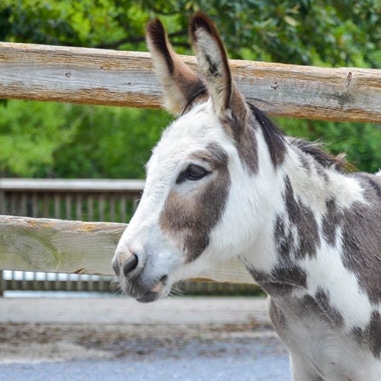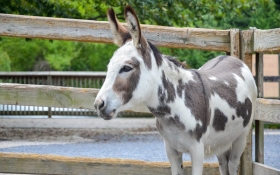
Miniature Mediterranean Donkeys
Equus ferus caballus
Animal Behavior: Donkeys are social animals. They are most active in the morning and evening, resting during the heat of the day. In the wild they travel in herds of several individuals to up to one hundred individuals, with an average group size of 4.7 animals. Donkeys are observant and cautious animals. They will refuse to do anything that seems dangerous to them. This behavior has earned the donkey its reputation for being stubborn, but actually, domestic donkeys are very obedient animals and will not refuse any reasonable order. When a donkey is startled by something, it usually will not run blindly in fear. Its natural instinct is to freeze or run a few steps, then look to see what frightened it. This is unlike the behavior of horses, which tend to panic and "bolt" when frightened.
Eating Habits: Donkeys are grazing herbivores, with large, flat-surfaced teeth adapted for tearing and chewing plant matter. Their primary food is grass, but they also eat other shrubs and desert plants. Like many other grazing animals, they grasp the plant first with their muscular lips, pull it into their mouth, and then tear it off with their teeth.
Range: True wild asses are found only in northern Africa and the Arabian peninsula, but domesticated and feral donkeys can now be found in all parts of the world.
Conservation Efforts: Although the future of wild and feral donkeys is uncertain, domestic donkeys are not in danger of extinction in the foreseeable future. However, donkey lovers in the United States and Europe have founded many organizations dedicated to the rescue, preservation, and care of wild, abandoned, or unwanted donkeys.
Animal Facts: The average life span of a wild donkey is 25 to 30 years, but in captivity they can live to be 40 to 50 years old. Smaller herds of wild asses are generally made up of one male and several females. Larger herds have multiple males and females. There don't seem to be any permanent bonds among individuals, herds are highly flexible, breaking up and reforming on an almost daily basis. Dominant male wild asses sometimes defend large territories in which many potential mates are also found. Subordinate males are also tolerated within the dominant male's territory.
